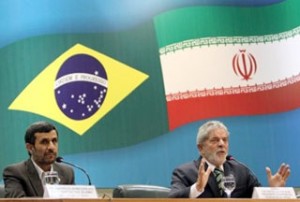
Recently Andres Oppenheimer pondered why Brazil is engaging Iran on the nuclear question and speculated whether the Brazilian government’s position on Iran was due to hubris, day dreaming, or maybe even Lula’s own interest in developing the “bomb.” He wrote,
“It’s a combination of the first theory, hubris, and the second, diplomatic day-dreaming. But I can’t keep from wondering whether hubris won’t lead sooner or later to greater nuclear ambitions. For the time being, Brazil’s overtures to Ahmadinejad are sabotaging international efforts to pressure Iran to abide by U.N. agreements, and are emboldening a repressive regime at home. Rather than behaving like a responsible emerging power, Brazil is acting like a reckless newcomer seeking world attention at any cost.”
Oppenheimer is another in a line of pundits, and even State Department officials, who now openly scorn the Brazilian government’s diplomatic efforts to bend the arc of Iranian history toward nuclear energy rather than weapons. In an early FPA Brazil blog entry I too questioned the Lula government’s welcome of Ahmadinejad to Brasilia and reluctance to openly criticize the later for his repression of protesters in the wake of the regime’s dubious presidential elections last year.
However, I wholeheartedly support Brazil’s efforts to support non-proliferation in the Middle East. Maybe I too am day dreaming, but where was Oppenheimer when U.S. Secretary of State Clinton openly denounced the Iranian government several weeks ago, standing in front of the even more dubious clan that governs Saudi Arabia without any sort of elections. Saudi Arabia does not tolerate political opposition and it has a horrific human rights record to back it up. Moreover, in recent years this country has amassed a significant offensive military capability, albeit conventional, contributing to the international security dilemma that challenges even the most pacific of Iranians. Remember, Saudi Arabia along with the United States and Kuwait supported Iraq’s offensive war against Iran, and the first two continue to pose a very real threat to the underdeveloped and aging defensive military assets of Iran. You don’t have to be a rocket scientist or a mullah to understand Iran’s apparent vulnerability.
Oppenheimer, if you are worried about Iran and pensive about Brazil’s efforts, then maybe you should think through the security dilemma created by the offensive military buildup of Iran’s neighbors, including Israel and the U.S. military deployments in Iraq and Afghanistan. Certainly, Minister Amorim of Brazil is cognizant of the very real military threats faced by Iran regardless of the current government’s repressive bent.
While we all should criticize Ahmadinejad’s rants against Israel, efforts to subvert the Iranian Presidential elections, and his repression of those courageous enough to protest against such constitutional subversion; Oppenheimer should concede that Brazil may be uniquely suited to wade through the international security issues that clearly foment Iran’s nuclear ambitions.
Brazil’s hubris or day dreaming, if any, is that its democratic credentials coupled to its national ban on nuclear weapons and its international commitment to non-proliferation of weapons of mass destruction place it in a category all its own. This may not be enough to convince Iran to deal nuclear deterrence away for the establishment of a regional collective security arrangement, but it’s the only card left short of preventive war… and we’ve all traveled that seemingly endless road.
Maybe that is why Catherine Ashton, the EU’s foreign policy chief, requested that Minister Amorim and the Brazilian government move forward with talks with Iran, noting that Brazil is now a “global power” and can play a “key role” in negotiations with Tehran.
Had the Brazilian government not insisted in its policy of engagement with Iran, despite the crescendo of criticism lodged by the likes of Oppenheimer, then everyone’s cards would already be on the table with little room for negotiations. Let’s just hope that the newcomer, Brazil, is holding the best card in the house.